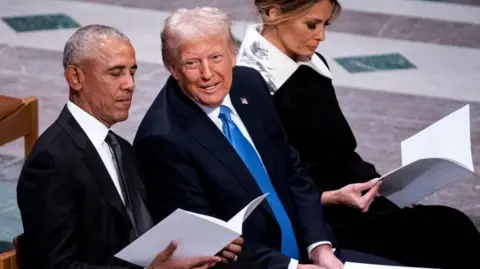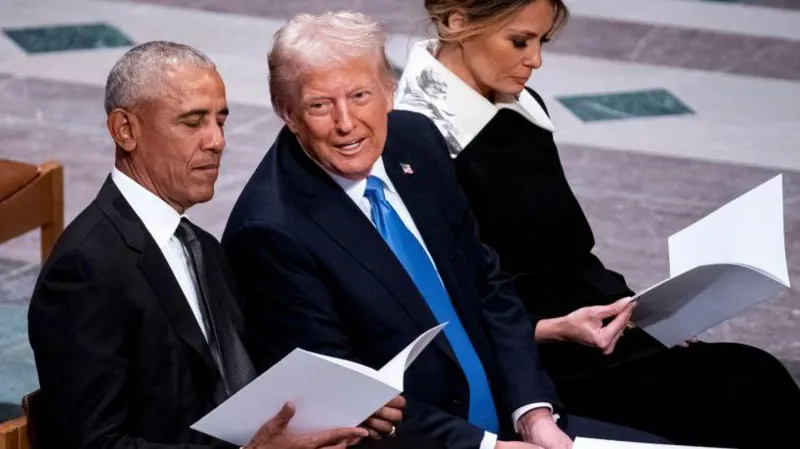BBC News
Donald Trump has accused Barack Obama of “treason”, claiming he plotted to sabotage his first presidency by linking him to alleged Russian election meddling.
“They tried to steal the election,” Trump said at the White House as he claimed Obama had sought to undermine his 2016 victory over Hillary Clinton.
A spokesman for Obama issued a rare retort, calling Trump’s attack “a weak attempt at distraction”.
Trump was referring to a report from US Director of National Intelligence Tulsi Gabbard last week that accused Obama and his national security team of a “years-long coup against President Trump” – findings that Democrats have branded false.
Trump’s comments on Tuesday came as he faced questions from reporters about late sex offender Jeffrey Epstein, who killed himself in prison in 2019 while awaiting trial.
The president’s administration has been under pressure to release more information about the well-connected convicted paedophile.
“The witch hunt that you should be talking about is they caught President Obama absolutely cold,” Trump told reporters.
“It’s time to go after people, Obama’s been caught directly,” he added.
“He’s guilty. This was treason. This was every word you can think of,” Trump said.
His comments came as he hosted Philippines President Ferdinand Marcos Jr in the Oval Office.
Obama spokesman Patrick Rodenbush said: “Out of respect for the office of the presidency, our office does not normally dignify the constant nonsense and misinformation flowing out of this White House with a response.
“But these claims are outrageous enough to merit one. These bizarre allegations are ridiculous and a weak attempt at distraction.”
 Getty Images
Getty ImagesFriday’s report from the Office of the Director of National Intelligence declassified emails between Obama aides, and argued they had suppressed intelligence findings that Russia had failed in probing attempts to hack US election databases.
A declassified copy of the president’s daily briefing prepared by US security service chiefs for Obama weeks after Trump beat Clinton and dated 8 December 2016 said: “We assess that Russian and criminal actors did not impact recent US election results by conducting malicious cyber activities against election infrastructure.”
But the FBI dissented from the findings it had initially co-authored, and a meeting was held at the White House a day later with top officials, according to the report.
Afterwards an aide to then-Director of National Intelligence James Clapper emailed intelligence chiefs asking them to create a new assessment “per the president’s request” detailing the “tools Moscow used and actions it took to influence the 2016 election”.
Gabbard argued the emails showed evidence of a “treasonous conspiracy” to harm Trump, and she threatened to refer Obama administration officials to the justice department for prosecution.
But Obama’s spokesman said in his statement on Tuesday: “Nothing in the document issued last week undercuts the widely accepted conclusion that Russia worked to influence the 2016 presidential election but did not successfully manipulate any votes.”
The US intelligence community published an assessment in January 2017 concluding that Russia had sought to damage Clinton’s campaign and boost Trump in the vote three months earlier.
US officials found this effort had included Russian bot farms on social media and hacking of Democratic emails, but they ultimately concluded the impact was probably limited and did not actually change the election result.
A 2020 bipartisan report by the Senate intelligence committee also found that Russia had tried to help Trump’s 2016 campaign.
Secretary of State Marco Rubio, who was a senator at the time, was among the Republicans who co-signed that report.
The first two years of Trump’s first presidency were overshadowed by an investigation from his own justice department into whether he had conspired with Russia to sway the 2016 outcome.
The resulting Mueller report found a lack of evidence that Trump or his campaign co-ordinated with the Kremlin, and no-one was ever charged with such crimes.
A subsequent special counsel inquiry, the Durham report, found the original FBI probe had lacked “analytical rigor” and relied on “raw, unanalysed and uncorroborated intelligence”.




